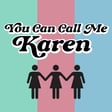
Why Can I Forgive This But Not That?
Welcome to the You Can Call Me Karen Podcast! This week we dive deep into the concept of justice, exploring the differences between vertical vs. horizontal morality and how these perspectives shape our legal and ethical systems. We trace the history of the justice system, from ancient laws to modern courts, and ask the fundamental question: Are humans innately good?
Join us as we examine how our views on justice have evolved, influenced by philosophy, religion, and societal change. Whether you're passionate about criminal justice reform, ethics, or philosophy, this episode offers a thought-provoking discussion on what fairness really means in today’s world. Listen now and challenge your perspective on justice!
Links to sources referenced in this episode:
You’re Wrong About podcast by Sarah Marshall. The episode is called “What even is Justice?”, it’s with Amanda Knox
https://www.aapl.org/docs/newsletter/N242hist_justice.htm
Book: The New Jim Crow by Michelle Alexander
13th - Watch 13TH | Netflix Official Site
Lastly, please follow us on Instagram (@youcancallmekaren), TikTok (@YCCMKPod), and like/subscribe wherever you get your podcasts!


















